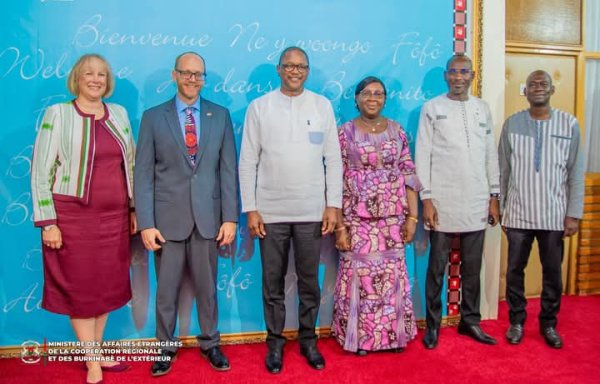Trump envoy visits Burkina Faso to rebuild U.S. ties amid strained diplomatic climate

An envoy from U.S. President Donald Trump visited Ouagadougou on Tuesday, May 27, 2025 in a move signaling a recalibration of U.S.-Burkina Faso relations.
Will Stevens, the U.S. Deputy Assistant Secretary of State for West Africa, was received by Burkina Faso’s Minister of Foreign Affairs, Regional Cooperation, and Burkinabè Abroad, Karamoko Jean-Marie Traoré.
The visit follows a diplomatic stir sparked in April when American General Michael Langley made controversial remarks about the exploitation of mineral resources in Burkina Faso.
The comments provoked strong protests from the Burkinabè government, with Minister Traoré publicly voicing concern over what was seen as an affront to the country’s sovereignty.
Speaking after the high-level meeting, Stevens emphasized Washington’s intent to mend ties and reestablish cooperation on equal terms.
“I come today with a message from President Donald Trump, which is to work together to build a pragmatic relationship based on mutual respect and respect for each country’s sovereignty; we can collaborate with each other, work together to face challenges and improve our relations,” he said.
Minister Traoré welcomed the diplomatic outreach, stressing the importance of direct engagement.
He reiterated Burkina Faso’s commitment to developing partnerships grounded in sovereignty and mutual benefit.
“As Burkinabè, as Sahelians, and as Africans, we want mutual respect, respect for our sovereignty; Africa is a continent like any other, and Africans are human beings like any other.
We want a change of perspective and interpretation, for us to understand each other, to avoid frustrating discourses, and to build our relations on an egalitarian principle,” Traoré stated.
On the security front, the Burkinabè foreign minister criticized certain Western policies that, in his view, hinder access to vital military equipment.
He urged for more pragmatic cooperation, especially in the context of Burkina Faso’s ongoing battle against terrorism.
Stevens, who assumed his role in January, assured Burkinabè authorities of his personal commitment to resolving such issues and advancing counter-terrorism efforts in the region.
Asked about General Langley’s earlier remarks, Stevens responded that his visit was intended “to send a positive message, to restore mutual trust, and to stimulate a new dynamic of cooperation between Ouagadougou and Washington.”
About The Author
dailymailafric
I am an avid African news observer, and an active member of Daily Mail Africa.
I’m Passionate about staying informed on diverse topics across the continent,
I actively contribute to publishing on political, economic and cultural developments in Africa.



